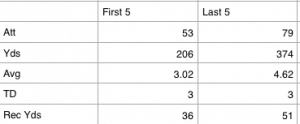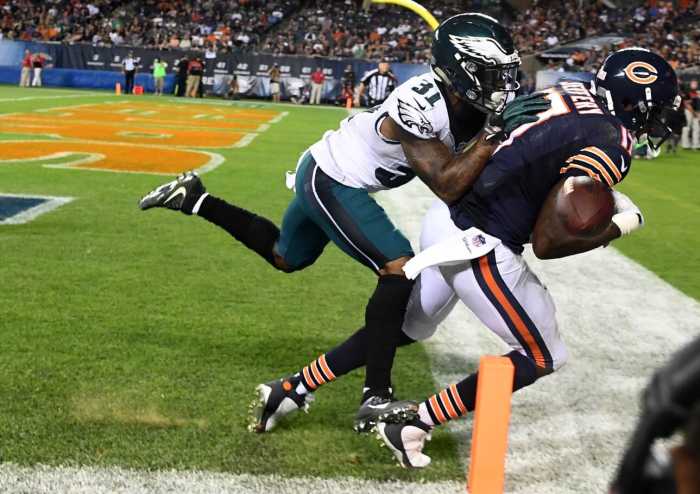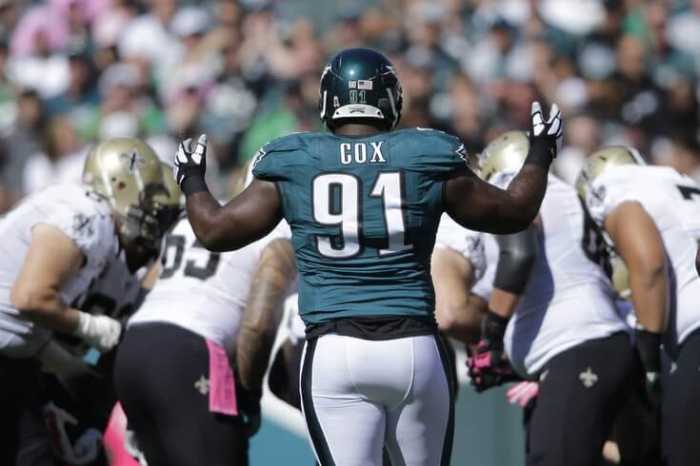With free agency in full swing, the Eagles have completely transformed their offense with the additions of Alshon Jeffery and Torrey Smith, along with bolstering the O-line. One of the few positions that hasn’t seen any change at all yet, has been running back. The consensus seems to be that the Eagles will release Ryan Mathews upon his return to full health. NFL teams aren’t permitted to release players when they’re injured without settlement, so the cap hit Mathews carries is still up in the air as his future dangles on a lifeline. But while the page seems to have already been turned, bringing Mathews back may actually make more sense than releasing him.
The 29-year old started last season brightly against the Browns, rushing for 77 yards and a touchdown on 22 attempts..but after that, things started to unravel. The Eagles committee effort flourished against the Steelers, with Smallwood and Barner scoring their first NFL scores and giving a glimpse of what could be..but would never eventually become.
Through a mix of injury battles and lack of direction, Ryan Mathews would find himself rushing for 56 yards against the Vikings one week, before carrying the ball just 4 times against the Cowboys, despite playing in 45% of Offensive snaps, the next. 2016 was a year of instability for the Eagles backfield..and the injury status of Mathews only contributed to that.
Mathews ended the year with 661 yards and 8 touchdowns, which was more productive than his first year in the City of Brotherly Love. But coming off of a serious neck injury, the “injury-prone” label is more deadly than ever to the former Chargers running back. The Eagles have a flurry of talent in the backfield, but no real direction implemented..meaning the entire future of the backfield is up in the air. The decision to cut Mathews would be one based mostly off cap relief and proneness to injury..but a decision to negotiate a short extension could be a very smart move.
For Mathews, the decision to restructure his deal or negotiate an extension for less is simple. The NFL Draft is stacked with running backs. From Christian McCaffery and Leonard Forunette, all the way down to Donnell Pumphrey and Marquell Beckwith, there is no shortage of power and potential in this year’s pool of talent. As a result, the free agency market for running backs is completely dry..even though there are some incredibly attractive proven talents still available. Here’s a short list of running backs currently without a team:
Adrian Peterson
Jamaal Charles
James Starks
DeAngelo Williams
Latavius Murray
Darren McFadden
LeGarrette Blount
Tre Mason
Knile Davis
Justin Forsett
Rashad Jennings
There is an over-saturation of product for a demand that simply isn’t there at the moment. Especially considering how incredible the draft class is set to be. With that in mind, if Mathews were to be released, there is no guarantee at all that he would find a new team. It’s more cost effective to draft a running back, Mathews is heading toward the tail end of his career and of course, there’s the health issue.
What Mathews has, is a chance to secure a job, While it’s common knowledge that his $5M cap hit could be well avoided, it would also mean Mathews is entering into dangerous waters. From his own/agent’s/financial standpoint, taking a pay cut would not only entice the Eagles to keep him around, but secure his future. If Mathews was to sign a 2-year extension and take a pay cut, the Eagles can tick a potential need off of their checklist and Mathews doesn’t have to compete with the likes of Latavius Murray, DeAngelo Williams and Jamaal Charles for a job.
But Liam, why would the Eagles re-sign Mathews to a 2-year extension if he can’t stay healthy?! Well, it’s clear that the Eagles tried (and failed) to implement a consistent committee effort last year. Signing him to an extension doesn’t mean he’d be starting every game, nor receiving the majority of snaps. But as a goal-line back, he was beyond effective in 2016. With Wendell Smallwood in the wings, one final serenade from Darren Sproles and some wildcards in the way of Byron Marshall and potential rookie signings, the Eagles could launch a true committee effort now that they’ve had time to reflect on what worked against the Steelers and why for whatever reason, that wasn’t sustainable.
Less snaps traditionally means more health. The Eagles wouldn’t need Mathews to pound it up the gut 30 times a game, they’d just need a change-of-pace back from the lead rusher (whoever that may be)..and that is something we all know he could do well. In fact, prior to his injury, Ryan Mathews was red hot. If you compare his first five games of the year compared to his last five..the difference is startling.
if there’s one thing we know about Ryan Mathews it’s that WHEN he’s healthy, the Eagles have a very dangerous back. What’s even more impressive is that he rushed for six more first downs than he did a year ago, 122 more yards and four more 20+ yard rushes. It’s safe to say that contrary to what we may believe to be true, Mathews found a real rhythm in Pederson’s offense. By limiting his snap count and rotating him in and out regularly as opposed to either putting all the chips on the table or leaving the Casino with no in between, it means that the durability factor shouldn’t be a concern.
We’ve all seen the Alshon Jeffery Contract and understand that if Torrey Smith fails to deliver in year one, the Eagles can cut ties with no consequence. A similar incentive based deal for Ryan Mathews would not only ensure the Eagles have some stability and continuity in the backfield, with a rusher that’s proven himself in the system, but also lower the cap hit that would have incurred anyway. Ryan Mathews would have his short-term future secured and has one more chance to prove himself worth of one last payday before the curtains come down on his career. The Eagles are becoming a low-risk, high-reward team..and a reworked deal for Mathews not only defines that, but could arguably be one of the most important contract moves of the offseason if it were to happen.
Of course, this is all theoretical. The Eagles have already elected against tendering Kenjon Barner and cutting a player just to open a hole that would need to be filled by a dominant 3-down back seems questionable IF (and only if) the Eagles want to pursue a true committee effort. Mathews is still a valuable asset to have, as we saw plenty of times in 2016. Limiting his snaps on a re-worked deal would benefit all parties involved.
But this is the NFL..and things are never that simple. Mathews is a running back who has flashed elite potential throughout his career but has been chained down with the same label that time is running out to shake. The question becomes, do the Eagles see enough in him to warrant negotiating such an extension?
Mandatory Credit: Eric Hartline-USA TODAY Sports





























